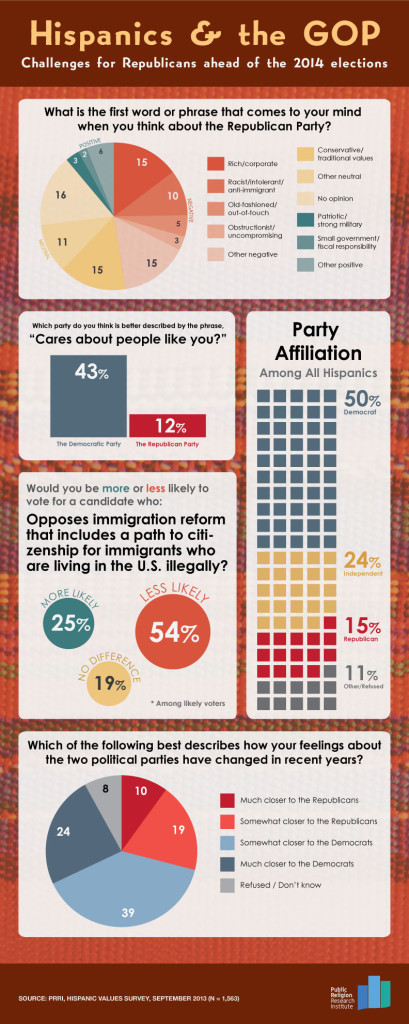 The challenges the Republicans face appealing to Hispanic voters has been well documented. Shortly after the 2012 election, Mitt Romney reported that the Hispanic support was a key reason for his loss, while a recent Republican National Committee report took direct aim at the problem by urging the party to address immigration reform as a way to attract Hispanic voters. News coverage (see here, here, and here) has highlighted the problems facing the Republican Party as they attempt to broaden their coalition to include more members of the country’s fastest-growing voting bloc.
The challenges the Republicans face appealing to Hispanic voters has been well documented. Shortly after the 2012 election, Mitt Romney reported that the Hispanic support was a key reason for his loss, while a recent Republican National Committee report took direct aim at the problem by urging the party to address immigration reform as a way to attract Hispanic voters. News coverage (see here, here, and here) has highlighted the problems facing the Republican Party as they attempt to broaden their coalition to include more members of the country’s fastest-growing voting bloc.
PRRI’s recent Hispanic Values Survey identified key areas where the Republican Party is struggling to appeal to this growing group of voters. PRRI’s Graphic of the Week highlights some the most serious hurdles facing the GOP in connecting with Hispanic voters.
First and foremost, the GOP has a brand problem when it comes to Hispanics. When asked to provide top-of-mind associations of the Republican Party, Hispanics offered largely negative comments. Nearly half of the open-ended associations Hispanics gave about the Republican Party were negative, about 4-in-10 (42 percent) offered associations that were basically descriptive or neutral, and just 11 percent of Hispanics offered positive associations with the Republican Party. Not surprisingly, Hispanics are three times more likely to identify as affiliated with the Democratic Party than the Republican Party, with half of all Hispanics identify as Democrat (50 percent), compared to 15 percent who identify as Republican. Roughly 1-in-4 (24 percent) Hispanics say they are politically independent.
Second, although the Democratic Party is not viewed incredibly positively among Hispanics, it benefits significantly in comparisons with the GOP. The Democratic Party enjoys a significant advantage among Hispanics in being viewed as sympathetic; 43 percent say the phrase “cares about people like you” better describes the Democratic Party, while 12 percent say it better d
escribes the Republican Party. More than 6-in-10 (63 percent) Hispanics report that they feel closer to the Democratic Party than they did in the past, while about 3-in-10 (29 percent) Hispanics say the same about the Republican Party.
Third, the Republican Party’s position on issues like immigration and health care are at odds with the views of most Hispanics. The issue of immigration reform remains important in determining Hispanics’ choices at the polls, with a majority of Hispanic likely voters (54 percent) reporting they would be less likely to support a candidate who opposes immigration reform that includes a path to citizenship for immigrants who are currently living in the country illegally. One-in-four (25 percent) say they would be more likely to vote for such a candidate, and 19 percent report that the candidate’s views on immigration would make no difference in deciding their vote.
As the GOP sets out to attract Hispanic voters, recent polling suggests the Party will need to focus on altering its image, and demonstrating to Hispanic voters that the GOP cares about the issues affecting their communities.